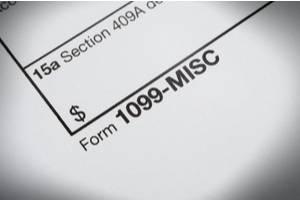When Is Backup Withholding Required for Payers Who File 1099 Forms?
 Business owners will need to address multiple types of tax issues, including withholding payroll taxes from employees’ incomes and paying these taxes to the IRS and the California Employment Development Department (EDD). These issues can become more complicated when a business hires independent contractors or when other types of payments are made. In general, payments that are reported on 1099 forms do not require a payer to withhold taxes. However, there are certain situations where the IRS may require backup withholding.
Business owners will need to address multiple types of tax issues, including withholding payroll taxes from employees’ incomes and paying these taxes to the IRS and the California Employment Development Department (EDD). These issues can become more complicated when a business hires independent contractors or when other types of payments are made. In general, payments that are reported on 1099 forms do not require a payer to withhold taxes. However, there are certain situations where the IRS may require backup withholding.
What Is Backup Withholding?
Form 1099 is an information return that lets the IRS know about certain types of payments made by a business. The recipients of these payments are expected to report and pay taxes on these payments. However if there are issues related to the reporting of payments, a payer may be required to withhold a certain percentage of these payments and pay these taxes to the IRS. The tax rate for backup withholding is 24 percent.
In most cases, backup withholding will be required because the recipient of payments failed to provide a correct taxpayer identification number (TIN). A TIN may include a person’s Social Security Number (SSN), an individual taxpayer identification number (ITIN), or an employer identification number (EIN). If a TIN is missing or incorrect, the IRS will notify the payer that they may be required to begin backup withholding for any payments made to the payee.
The IRS will send a CP2100 or CP2100A Notice to a payer, and this notice will include a listing of missing or incorrect TINs. The payer can compare the information provided in a notice with their own records, and if they confirm that the TIN information is missing or incorrect, they must begin backup withholding on payments made within 30 days after receiving notice from the IRS. The payer must also provide a backup withholding notice and a Form W-9 to the payee within 15 days after the date of the CP2100 or CP2100A Notice. If the payer receives a Form W-9 from the payee or a validation of the payee’s TIN from the IRS, they must stop backup withholding within 30 days.
Backup withholding may be required on multiple types of payments reported on 1099 forms, including:
-
Payments, fees, or commissions to independent contractors (Form 1099-NEC)
-
Interest payments (Form 1099-INT)
-
Dividends (Form 1099-DIV)
-
Payment card transactions or other payments made through third-party networks (Form 1099-K)
-
Royalties, rent, prizes, awards, and other miscellaneous income (Form 1099-MISC)
Contact Our San Jose Tax Law Attorney
Tax issues related to independent contractors or other payments reported on 1099 forms can be complicated. Employers or others who have received notice that incorrect information has been reported on these forms will need to understand the requirements they must meet regarding backup withholding. At John D. Teter Law Offices, we can help you understand the best ways to address these situations and ensure that you will be able to avoid penalties or other tax-related problems. To discuss issues related to employment taxes or other small business tax issues, contact our San Jose, CA tax lawyer at 408-866-1810.
Sources:
https://www.irs.gov/businesses/small-businesses-self-employed/backup-withholding
https://www.irs.gov/businesses/small-businesses-self-employed/backup-withholding-b-program
https://www.irs.gov/pub/irs-pdf/p1281.pdf









